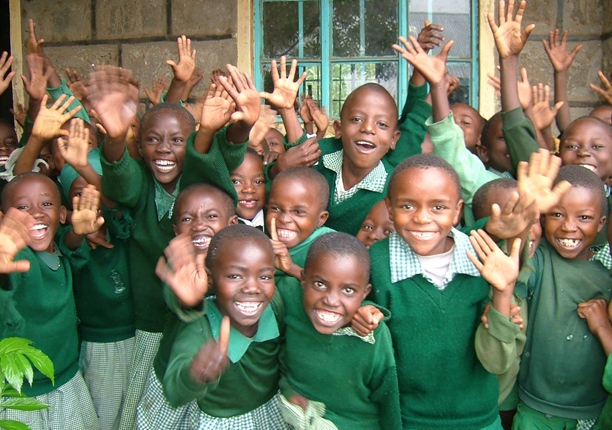The 2021 Multiple Indicator Cluster Survey, MICS, report released by the Nigerian Government on Early childhood Education enrollment is 37.8%, an obvious increase in Pre- Primary school enrollment in the country.
Investigation by our Woman Editor, Joyce Remi-Babayeju, reveals that early Educational childhood enrollment a prerequisite for foundational literacy and Numeracy is fast becoming compulsory and popular among parents in Enugu State.
Nine -year- old Nkiru Igwe , a Primary One pupil at New Haven Primary School in the Enugu State North Local Education Authority, wants to be a Doctor.
Igwe who seems to struggle to communicate in English language said, ” I wan do doctor” with excitement and a smile on her face in the midst of trying to fill in the gap for her teacher by controlling her noisy classmates in Igbo language.
Her classmate, 6- year- old Chimayan Emeka, also in primary one class on her part, said she wants to be a Chef when she grows up.
When asked questions in English, language, Chimayan said she that cannot speak English even though she comes to school everyday.
The two pupils whose ages obviously have passed the primary one class are in school but seem to have missed the Foundational Early Childhood Education, ECCE which teaches the Foundational reading and writing.
The Early Childhood Education schooling system exposes children from age three to pre – nursery ,one, two and three classes before entry into primary one class.
The ECCE class prepares children entry into Primary school, where they learn through play, playing toys and other colourful books which exposes them to Foundational literacy and Numeracy at the primary school level.
Nkiru and Chimayan are obviously a fraction of the percentage of children who are in school but are bereft of the Foundational reading and numeracy which is still a huddle to cross if Nigeria’s educational system must meet the Sustainable Development Goal 4 on education for all by 2025.
New Haven Primary School is in located in the heart of Enugu metropolis with upgraded buildings and classrooms but the population of pupils in each class is about 39 and even some with 50 pupils for a teacher to cope with.
This could be the reason some children are able to pick up while others are left behind , not by the teacher’s choice but due to over crowding and inadequate provision of teaching aids to compliment learning.
The Head Teacher of New Haven School, Mrs. Owoh Regina who spoke with this reporter said that pre – school enrollment into Pre- Nursery, Nursery one and two at New Haven Primary School has been very encouraging as it is becoming popular for parents to bring in their children from age three to start schooling.
Owoh said that in her four years of overseeing the affairs of the school , the ECCE system of learning had existed before she was posted four years ago by the Eungu Universal Basic Education Board, ESUBEB, with about 25 pupils in each class.
She noted that although the State Education Board is trying to sustain the pre- primary classes, the challenges outweigh the results.
“We don’t have much of teaching aids, like buildings blocks commonly known as Lego which very young children can play with.”
“Lego which is a play building blocks for children is not enough to go round the four arms of classes. Teachers have to take turns to use the very few available ones.
An ECCE Teacher Mrs Maryanne Eze who spokeq passionately on the teaching technique for the pre- primary class said that although school attendance is encouraging , the school lacks teaching materials and pleads that government should make available teaching and learning aids.
Eze said, ” Basically we do not have teaching materials like ABC charts, Parts of the Body, building blocks, small tennis balls for play for pupils to exercise, beautiful text books, ABCD chart mats which is spread on the floor because as they are lying down they are also learning.
In addition to this Pre-primary classes need other toys they can manipulate and play with.
According to the teacher, the school has channeled their requests for these teaching and learning materials, adding that once there are teaching materials to compliment teaching and pupils to learn.
“So far, a Corper and some parents donated some of the teaching materials which we are using,”
Speaking on the importance of ECCE in Enugu State, the Director School Services, ESUBEB Mrs. Julie Ngozi Ugwu, confirmed that attendance of school enrollment is about 40% of children out- of- school and 60% of children are in school.
Ugwu said that ESUBEB is urging the government to come to our aid so that the 40 percent out- of – school children in Enugu State will go back to school.
She however stated that the norm has changed in Enugu State as more boys now enrol in schools for them to aquire the basic education before going into business.
She affirmed that the challenges of inadequate teaching and learning materials in schools is real but that it is deliberate as part of the training of teachers to improvise because government is unable to supply all the educational materials.
“They improvise because bringing education down to the grassroots needs the use of local examples , by using things that can be readily found in the environment to bring down knowledge to children.”
“Using local examples helps to internalize knowledge, like using of clay to mould objects, use of palm fonds to make brooms among others.”
According to Ugwu a major challenge is the state educational system is inadequate funding which hinders adequate monitoring of teaching and training as followup in schools.
Poor enumeration of teachers is affecting output of teachers. “We have qualified teachers but they are not functional . Good enumeration of primary school teachers is important bey they are the foundation of education.”
The roblem of insecurity in the state has become a major challenge in recent times affecting school attendance in Communities. Citing places like Uzoukwu Local Government Area and Uzor 1, Udi, where eleven people were killed.
The issue of kidnapping is high here , we cannot go to rural areas or anywhere to schools. In Uzor 1, we cannot go there because there are lonely spots around the road leading to Communities, this is where herdsmen and unknown gunmen operate, so we cannot go to schools that have been commissioned in Isiuzor Local Government Area and other rural Communities to monitor schools, the Director School Services complained.
Although a state like Enugu is fast embracing the ECCE curriculum, there is need to do Moore to catch up with the global trend of Foundational literacy and Numeracy, FLN, education for children of primary school age to learn on how to read and do simple arithmetic.
According he 2021 MICS report, a survey data carried out by the National Bureau of Statistics, NBS, a compendium of the Global sponsored partners like Bill and Melinda Gates Foundation, GAVI, and technical support by UNICEF, school entry and attendance in Nigeria has gradually picking up to a net attendance rate of 68.4 % from it’s estwhile downward curve.
MICS reveals that early school attendance in Nigeria 37.8 % , children in relevant age group in school 63.2%.
First Grady of primary school attendance 42.8% , net attendance rate of school children like 68.4% and gross intake ratio of primary school children 66.2% and rate of Out-of- School children 25.6% while rate of over age for grade in primary school in which Nkiru and Chimayan fall into is 29.7%. Nigeria ( MICS 2021) Report.
Earlier the World Bank and UNICEF had warned that Nigeria is facing a Foundational literacy and Numeracy crisis, but gladly it appears governments have taken the bull by the horn by priotizing early school enrollmment and inclusion in schools curriculum. More children at the pre primary grade are now in schools though learning with limited teaching materials.
There is no doubt that more needs to be done by government through more sensitization on parents and caregivers to make children go to school and provision of teaching and learning materials for teaches to actualize their job if the SDG 4 which ensures inclusive and equitable education for every child must be achieved.





